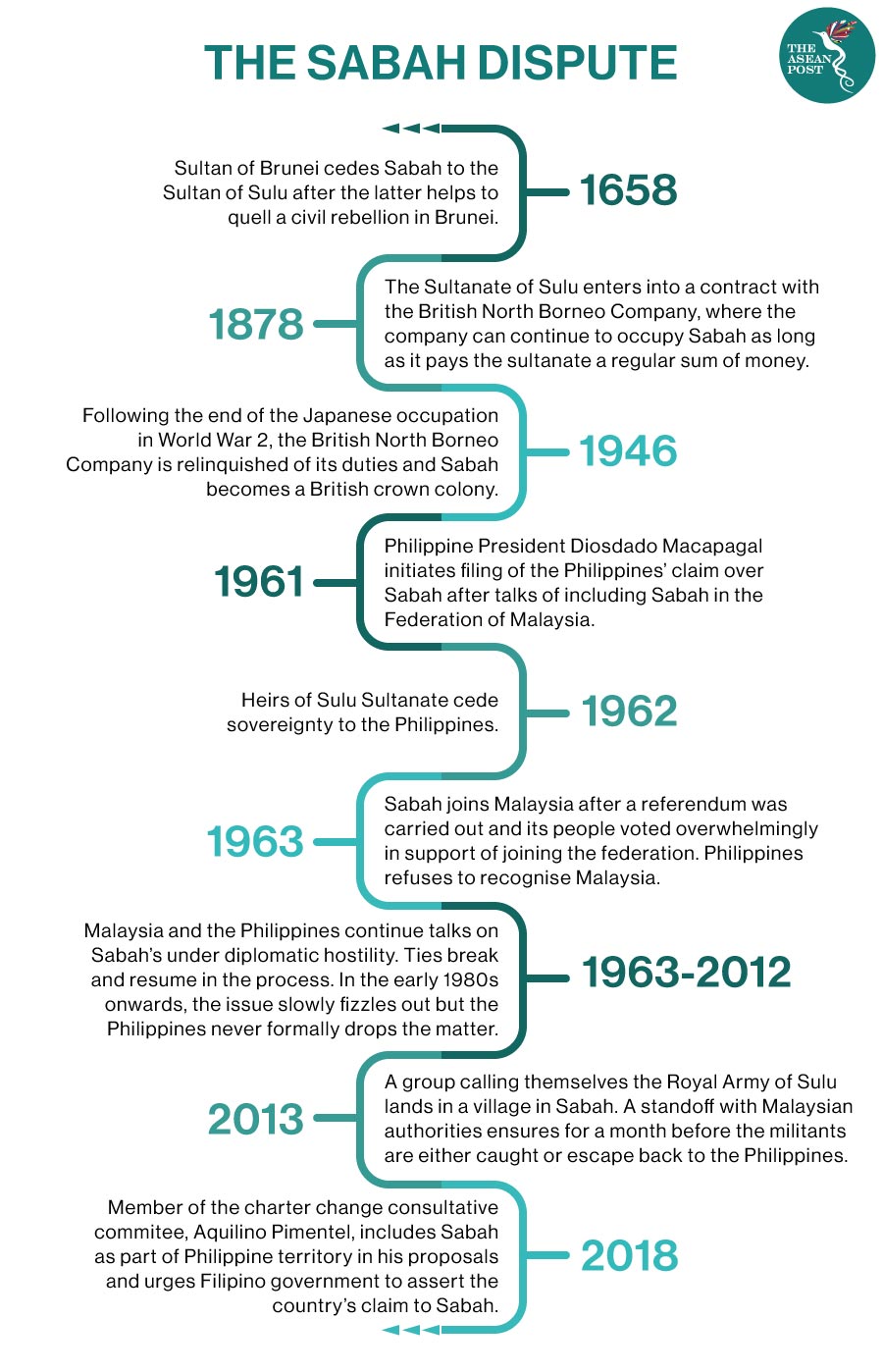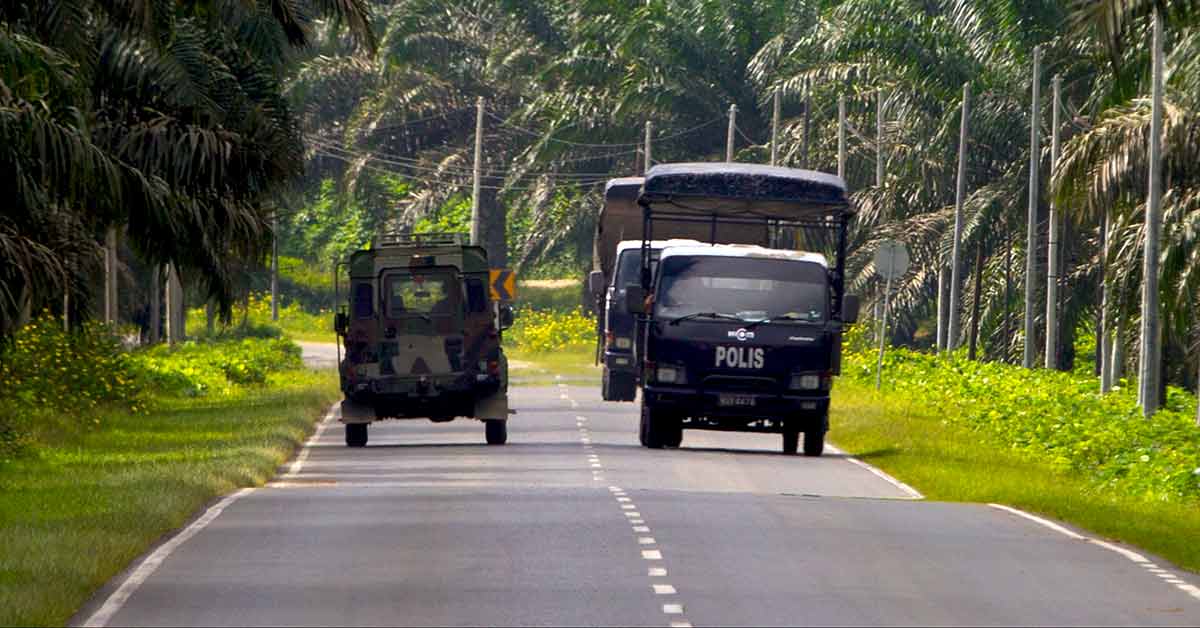The veiled and quiescent annoyance in the relationship between the Philippines and Malaysia over the “Sabah Dispute” has suddenly been rekindled by recent exchanges on Twitter between the two top diplomats of both countries.
Just recently, the Philippines Foreign Secretary, Teodoro Locsin Jr. as a reaction to a United States (US) embassy item describing Sabah as part of Malaysia rendered a rectification to the said depiction via a Twitter post by saying that, “Sabah is not in Malaysia if you want to have anything to do with the Philippines.”
The claim by the Philippines Foreign Secretary received an equally fierce reaction from the Malaysian Foreign Minister, Hishammuddin Hussein, who responded through his official Twitter account by saying that he would summon the Philippine ambassador in response to his Philippine counterpart’s tweet on 27 July, 2020.
“This is an irresponsible statement that affects bilateral ties,” Hishammuddin said. “Sabah is, and will always be, part of Malaysia.”
Nevertheless, the scuffle on Twitter between the two diplomats did not end there.
Locsin rebutted his Malaysian counterpart via another Twitter post by saying that he would also summon the Malaysian ambassador in Manila. He said, “No country can tell another what it can and cannot say about what the latter regards as rightfully its own. I am summoning the Malaysian ambassador.”
Likewise, Locsin was also quoted in some news reports as saying that he would revive a departmental office dedicated to Philippine government efforts on the Sabah issue. Also, a proposal by a Philippine congressional committee to include Sabah in the map of the Philippines to be printed in Philippine passports grabbed headlines in Malaysia too.
In September 2019, Malaysia issued a strongly worded statement as a warning to the Philippines after Locsin avowed the Philippines’ claim to Sabah on various occasions including his statements on Sabah in a congressional budget briefing. The statement read: “Any remarks alluding to ‘anachronistic claims’ would be rejected as unfriendly towards Malaysia. Malaysia does not recognise and will never entertain any claims by any party on Sabah.”
Thus, the recent affray between Locsin and Hishammuddin on Twitter to some extent resuscitated the dormant, long-standing but disquieting territorial dispute between the two ASEAN neighbours over the claim on Sabah.
The Sabah Dispute
The dispute is about the claim of both countries over much of the eastern parts of Sabah, one of Malaysia’s 13 states. Sabah was previously known as North Borneo before the formation of the Malaysian Federation in 1963.
To note, Peninsular Malaysia, was restructured as the Federation of Malaya in 1948 – a federation of what previously had been British Malaya comprising of 11 states that existed from 1 February 1948 until 16 September 1963 – and achieved independence on 31 August, 1957.
It then formally emerged as Malaysia with the inclusion of Singapore, North Borneo (Sabah) and Sarawak on 16 September, 1963 when Malaysia inherited the British colonial enterprise in Northern Borneo.
Nevertheless, the establishment of the Federation of Malaysia resulted in the following disputes: (a) conflict with Singapore; (b) the opposition and resistance of the Philippines and Indonesia to the inclusion of Sabah, along with Sarawak to the Federation of Malaysia that led to the “confrontation policy” (Konfrontasi) by Indonesia vis-à-vis Malaysia; and (c) the Philippines’ claims of sovereignty over Sabah, which fostered a somewhat sour relationship between the Philippines and Malaysia.
In the case of Singapore's union with Malaysia, it was short-lived and lasted for less than 23 months. Prime Minister Lee Kuan Yew signed the Malaysia Agreement in London on 9 July, 1963, and eventually, Singapore gained its independence from Malaysia on 9 August, 1965.
However, the Sabah or North Borneo Dispute as it is often referred to, remains unresolved until today, and continues to be a “speck in the eye,” and an unsettling thorn in the bilateral relations between the Philippines and Malaysia, which has subsisted for over three decades.
Philippines Claim Over Sabah
Sabah is located at the north-eastern tip of Borneo and lies about 500 kilometres from the Philippines. Although Malaysia controls the territory, the Philippines has laid claim over Sabah since 1961.
The first official attempt by the Philippines to claim Sabah was on 22 June, 1962, when the Philippines filed a claim over Sabah against the United Kingdom (UK), which has possession of the territory at that time.
The Philippines contended that “the sovereignty over the territory has remained vested in the Sultanate of Sulu. The occupation of the territory first by Overbeck and Dent and later by the British North Borneo Company had been occupation by lessee or an administrator, not occupation by an owner or sovereign.”
The Philippines was explaining the history and legal basis of its claim over Sabah and the origins of the dispute to the UK government. The UK is party to the dispute because it was responsible for handing Sabah/North Borneo to Malaysia.
Before the annexation of Sabah as part of Malaysia, it was ruled by the Sultanate of Sulu.
Sabah was originally ruled by the Sultanate of Brunei in the early 1500s under the rule of Sultan Bolkiah. In 1658, Sabah was ceded to the Sultanate of Sulu for helping the Sultanate of Brunei settle and suppress a revolt.
The Northeast coast of Borneo (Sabah) was awarded by Brunei Sultan Abdul Hakkul Mubin to the Sulu Sultan Salah-ud-Din Karamat Bakhtiar. From 1735-1742, Sabah was under the control of the Sultanate of Sulu, especially by its coastal inhabitants.
However, the control over the territory was relinquished to the British, specifically to the British North Borneo Company between 1878 and 1946 under the treaty signed on 4 January, 1878 between the Sultan of Sulu Mahomet Jamal Al Alam and Baron de Overbeck and Alfred Dent as a contract of lease, grant and concession of North Borneo territories for an annual payment of 5,000 dollars. Later on, the British North Borneo Chartered Company surrendered its duties and North Borneo became a British crown colony on 10 July, 1946.
The Philippines maintains its territorial claim over Sabah based on the 1878 “Lease Treaty” and based on the historical account that Sabah is a gift from the Sultan of Brunei to the Sultan of Sulu, which is now a region and part of the sovereign territory of the Philippines. The Philippines stands firm that the 1878 Treaty was a Lease and not a “Deed of Cessation” as opposed to the claim and contention of Overbeck and Dent on 22 January, 1878, where the British North Borneo Company presented the said treaty in London saying that the Sultan of Sulu ceded North Borneo to them under their translations and interpretations of the contents of the 1878 Treaty.
Overbeck and Dent’s version of the 1878 Treaty stated that “all the rights and power belonging to me over all the territories and lands being tributary to us on the mainland on the island of Borneo in consideration of a yearly compensation of 5,000 dollars, together with all other powers and rights usually exercised by and belonging to sovereign rulers and which we hereby delegate to him of our own free and sovereign will.”
Nevertheless, since the founding of the Federation of Malaysia in 1963 till this day, the Philippines has refused to recognise the possession of Sabah by Malaysia. The Philippines has maintained its contention that Overbeck and Dent only transferred the rights on the leasehold and not sovereignty over Sabah since the transaction was a private one.
Overbeck and Dent's partnership had no political bearing and Sabah was under the suzerainty of the Sultan of Sulu and Borneo. And the annual payment of 5,000 dollars was equivalent to the lease term. However, the British government maintained its stand on the matter that North Borneo was ceded to them and it refused to allow any Filipino or third party for that matter to examine its copy of the contract. Sultan Mahomet Jamal Al Alam’s copy was stolen in Singapore.

Malaysia’s Claim To Sabah
On the other hand, Malaysia’s claim over Sabah has been very much dependent on the legitimacy, legality, and authenticity of the claims of the UK, more particularly of Overbeck and Dent over Sabah/North Borneo based on the 1878 Treaty’s grant and concessions and their effects, since Malaysia was a former colony of Britain.
Likewise, Malaysia considers the Philippine claims over Sabah a “non-issue” as Sabah in 1963 along with Sarawak, and Singapore was part and parcel of the founding states of the Federation of Malaysia, which accordingly was an act of “self-determination” by the Sabah populaces.
To note, the people of Sabah were allowed by the United Nations (UN) Secretary-General to be part of the Malaysian Federation in August 1963 given the results of the “Cobbold Commission of 1962”, which was set up to determine the consent of the people of Sabah and Sarawak, and surveyed their voices if they were amenable to joining the Federation of Malaysia. It was found that people generally favoured the union of Malaysia, leading to the signing of the Malaysia Agreement in London on 9 July, 1963.
Accordingly, the agreement clearly stated that Sabah is part and parcel of the Federation of Malaysia along with Sarawak and Singapore. Ever since, Sabah has been under the direct control of Malaysia.
Furthermore, S Jayaratnam, the vice dean of the Faculty of Law, University of Singapore defended Malaysia by averring that the Philippines’ claim was weak because neither the Philippines nor the heirs of the Sultan have exercised sovereignty or been in effective occupation of Sabah since 1878. Also, Malaysia contends that Sabah has been recognised by the UN and by other countries worldwide as a Malaysian territory thus justifying their claim.
Conclusion
Indeed, the Sabah Dispute between the Philippines and Malaysia remains unresolved until today fundamentally because of the contending claims on the 1878 Treaty between the Sultanate of Sulu and the British North Borneo Company or the British government for that matter.
There is no clarity or resolution till this day if indeed Sabah was ceded to the British or not by the Sultan of Sulu, or if it was only leased to them.
One thing is certain. Sabah was ceded to Malaysia together with Sarawak and Singapore by Great Britain to form the Federation of Malaysia in 1963.
Thus, the Sabah conflict will continue to be a thorn in the side of bilateral relations between Malaysia and the Philippines until it is eventually resolved. As to when it will finally be settled is yet to be ascertained. Hence, the issue remains undetermined as it has been for so many years.
This is Part One of the “Sabah Dispute” series of articles.
Related Articles:

